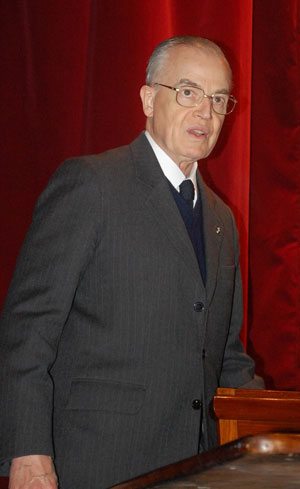Brazil’s Agência Boa Imprensa (ABIM) has interviewed Prince Bertrand of Orleans-Braganza about his recent book Environmentalist Psychosis, which denounces the ongoing ‘eco-terrorist’ campaign on climate change waged by the adepts of global warming. Prince Bertrand is an outspoken writer and speaker and a member of Brazil’s royal house and a direct descendent of Saint Louis IX of France.
Based on the findings of renowned scientists, Prince Bertrand explains the impossibility for man to influence the climate, at the same time as he points out the existence of an ideology underpinning this exaggerated defense of nature: it is none other than a Marxist ideology, now camouflaged in green.
The illustrious author goes even further by denouncing the existence of a ‘new religion’ that seeks to justify the imposition of an egalitarian and neo-tribal society based on a mixture of pseudo-science with archaic pagan philosophies.
ABIM: Your book, Environmentalist Psychosis, claims that global warming is not the result of human activity and points out the existence of media ‘eco-terrorism’ regarding climate change. What do you mean by that?
Prince Bertrand: In one chapter, I show how sectarian environmentalists— “reds” which have turned “green” — use the weapons of intimidation and fraud in order to attain their goals. In fact, they don’t even bother to hide it. As far as they are concerned, any means to lead people to their goals is good. From the Marxist standpoint, “truth” is everything that favors the communist cause. These “environmentalists” have no difficulty running roughshod over solid science, which affirms that global warming is a farce.
Since what matters for them is to impose a radical, ecologist egalitarianism in a neo-tribal society, it’s too bad for truth and for science.
ABIM: Could you give us an actual example of that?
Prince Bertrand: I will quote two statements by radical environmentalists:
1) “History teaches us that humanity evolves significantly only when it feels truly afraid. We must build a world police, create world food reserves and implement a global tax system. In this way we will be able to lay the foundations of a true world government faster than if driven by mere economic reasons” (Jacques Attali, French socialist and former presidential adviser).
2) “No matter if the science is all phony, there are collateral environmental benefits…. climate change [provides] the greatest chance to bring about justice and equality in the world” (Christine S. Stewart, Canada’s former Minister of the Environment).
ABIM: Do you believe there are agents behind the NGOs that create this exacerbated environmentalism?
Prince Bertrand: The two statements above clearly show the intention of setting up a world government “in order to impose justice and equality” as they see it.
ABIM: But scientists disagree about this issue…

Prince Bertrand: The renowned Brazilian scientist, Prof. José Carlos Almeida de Azevedo, Ph.D. in physics from the Massachusetts Institute of Technology (MIT) notes that there is no proportion between human action and that of nature. Man is unable to change the climate.
How can anyone believe that man influences nature just looking at everything which has been here for millions of years? Nature is here that way and will continue the same for many million years.
ABIM: A significant increase appears to be occurring in the frequency and intensity of natural phenomena. How can one not see this as a result of human vandalism?
Exposing the Eco-Myths at the Rio Summit
Prince Bertrand: Professor Luis Carlos Molion – undoubtedly one of the greatest Brazilian authorities on climate matters – clearly shows that one must not confuse the intensity of meteorological phenomena with the vulnerability of society, which increases with population growth.
Society tends to gather in great cities, thus making more catastrophic today a phenomenon which occurred with the same intensity in the past. The deadliest hurricane ever in the United States occurred in 1900, killing over 10,000 people. At that time, the local population density was much smaller than today and the same hurricane now would probably have a much more devastating effect.
ABIM: For sure there are ill-intentioned environmentalists, but aren’t there also well-intentioned people seeking to protect nature?
Prince Bertrand: We need to distinguish between true and sectarian environmentalism. Good and orderly environmentalism consists in preserving nature in order to foster a healthy life for plants, animals, and especially men.
But God established hard work as a punishment for the sin of Adam: “My elect will eat the fruits of the work of their hands.” Nature became hostile and had to be mastered by man’s talents and abilities.
ABIM: Where does ‘religion’ come into this environmentalist issue?
Prince Bertrand: In fact, it was the Catholic Church that converted and civilized the barbarian peoples, teaching them to till the land and to preserve nature with wisdom and a desire for perfection.
As to the new proposals to defend nature presented by the media and by world leaders and international agencies, unfortunately behind most of this campaign is a hidden ideology and even a new religion meant to justify an egalitarian and neo-tribal society based on a mix of pseudo-science with archaic pagan ideologies.
ABIM: Don’t you think that farmers, industrialists or anyone else would destroy nature if we allowed them to do what they want?
Prince Bertrand: The farmer is the person most interested in the sustainability of his own business, and in his upright conscience he does not want to see his farmstead turn into a desert. By the way, this is lamentably what actually happens in agrarian land reform settlements, where the land belongs to no one and settlers usually devastate the area under their control.
Yet environmentalists – who turn their undisguised animosity toward hard-working farmers and cattle ranchers who promote our development – fail to address the deplorable situation of land-reform settlers.
ABIM: How to convince the public at large about this?
Prince Bertrand: Just as no one sets up a factory to leave it the following year, so also no one cultivates a field to abandon it later. Like any economic activity, farming and cattle-ranching are conceivable only if sustainable.
Sustainable agriculture is almost a pleonasm. The hands that sow are the same that care! Thanks to the efforts of farmers and to the discovery of new techniques it was possible to transform Brazil into the world’s second largest grain exporter. This reality is ignored by environmentalist propaganda, which continues to spread lies.
The role of agriculture in preserving nature is enormous. Agriculture generates solutions for the preservation of water and of biodiversity. Furthermore, it provides one of the world’s cleanest sources of energy.
ABIM: What do you think about carbon credits?
Prince Bertrand: This is another myth of environmentalism. CO2 does not produce pollution or the so-called greenhouse effect.
CO2 is the gas of life. It is a natural gas responsible for plant growth. If we eliminated CO2 from the atmosphere, life on Earth would cease.
According to Prof. Molion, the main gas related to the greenhouse effect – if it really exists — is water vapor. In some places and on occasion, its concentration is up to 100 times greater than that of CO2. The latter, for its part, is a natural gas. In a certain sense it is the gas of life even more than oxygen.
In the unlikely hypothesis that we eliminated CO2 from the atmosphere, life on Earth would cease. Men and other animals feed on plants and do not produce themselves the foodstuffs they consume. It is plants that through photosynthesis, absorb CO2 and produce starches, sugars and fibers and as a byproduct, the oxygen that we breathe. Other gases such as methane and nitrogen oxides are present in very low concentrations that do not cause problems.



